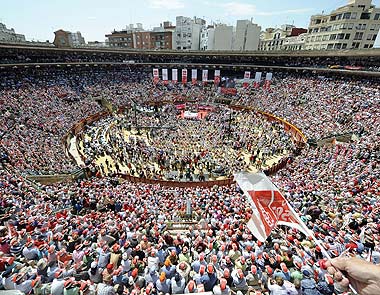MAP6 - Euro-BRICS Special
With this special MAP issue devoted to future Euro-BRICS co-operation,
LEAP/E2020 continues its exploration of the path which leads to the world after
the crisis. In this case, with the Euro-BRICS partnership it’s a question of
anticipating the processes which will make it possible to build twenty first
century governance and allow a peaceful rebalancing of relations between the
planet’s key powers. LEAP/E2020
- MGIMO
Results of the fourth BRICS summit and the outlook for cooperation between
the BRICS and the European Union, by Prof. Valery Vorobiev.
The fourth BRICS summit drew to a close on Thursday the 29th March 2012 in
New Delhi. In their six years of existence, the BRICS have become a factor of
global importance. Made up of the largest emerging powers of the four corners of
the globe, they account for 43% of the world’s population and 25% of its
GDP. Download
MAP6-May2012 (free)
Extract from the conclusions of the Euro-BRICS Process founding seminar,
by LEAP.
In the framework of this first Euro-Brics seminar, the last session
consisted of a general brain-storming panel aimed at identifying themes of
common interest, therefore likely to provide the basis to the agenda of a first
Euro-Brics Summit. The following nine key points were identified... Download
MAP6-May 2012 (free)
Prospects of a EuroBRICS strategic cooperation: a view from Brazil, by
Alexander Zhebit.
prospect of an economic and political union between the BRICS and the Euroland
may be an illusion, although not at all impossible. Instead, a road map to a
Euroland-BRICS strategic cooperation or even partnership may and should be
traced, if we adhere to the LEAP declared purpose and if agree with some
conclusions that are made on the basis of an empirical evidence. Download
MAP6-May 2012 (free)
Russia and Brazil in the BRICS group - future ambitions, by Ludmila
Okouneva.
The principles shared by the BRICS (and stated in March 2012 at the five
countries’ summit in New Delhi), such as the necessity for overhauling the
international and economic financial system, these countries’ right and proper
role in the world economy as well as the principles of non-alienation, from the
free choice of priorities in international policy, etc. Download
MAP6-May 2012 (free)
The Role of Euro-BRICS cooperation, by Chandrasekharan Jayanthi.
If we are looking ahead to a strong future for Indo-European Union (EU)
relations, it has to go beyond crystalball gazing. The EU is now a conglomerate
of 27 members and, come July 2013, it will have 28 members with the inclusion of
Croatia. The European Union is the single largest economic player in the world
today with considerable economic weight and global influence. Download
MAP6-May 2012 (free)
BRICS cooperation serving trade policy formation and the priorities of
BRICS and Euro-BRICS cooperation, by Dr. Tatiana M. Isachenko.
Trade policy is generally understood as a complex of measures that permit
the most effective use of economic development’s external factors to increase a
country’s share in world trade and investment. Understanding this proves the
necessity of Russia’s participation in trade negotiations and the settingup and
implementation of favorable agreements. Download
MAP6-May 2012 (free)
China’s Policymakers One Inch Closer to Opening Capital Account, by Zhu
Changzheng.
Recent proposals issued by China’s central bank point to substantial
shifts in plans for capital account convertibility. Will it be a step on the
long march towards more Euro-BRICS cooperation to get out of a Dollar dominated
global monetary system? Download
MAP6-May 2012 (free)
Prospects for collaboration in the knowledge economy field, by Anna
Makarenko.
In the knowledge economy, the human factor becomes an essential resource.
However, its potential in the BRICS countries still remains under-exploited. It
must be used more, thanks to significant reform of the education system and by
guaranteeing employees adequate access to new technologies. In this respect,
co-operation between the EU and the BRICS would be very beneficial. Download
MAP6-May 2012 (free)
The European path to space is via China and Russia, by Stefan
Hilgermann .
The most powerful rockets, boundless motivation and streams of funding -
whoever wishes to get to grips with the idea of which nation is best equipped to
pass the winning post in the medium term among the space nations should look
towards China. In any case this is Thomas Reiter’s opinion,one of the ESA
directors, who has just visited the Peoples’ Republic and who was deeply
impressed by what he saw. Download
MAP6-May 2012 (free)
Euro-BRICS and sovereign technologies: Space, by Jean-Paul
Baquiast.
Sovereign technologies are those which make it possible for a geopolitical
power to assert its desire for independence and power in a now multipolar world.
For that, they must be developed by this power with its own resources. Download
MAP6-May 2012 (free)
EUROPE, BRICS AND SPACE - A contribution to the debate on Euro-BRICS
cooperation in space activities, by Tanja Masson-Zwaan.
The BRICS are indeed fast becoming the space powers of the new millennium
and ‘Europe’ needs to continue and intensify its already existing cooperation
with the BRICS countries, both in the framework of ESA and the EU. This paper
addresses current Euro-BRICS cooperation in the field of space activities, and
argues in favour of its further intensification. Download
MAP6-May 2012 (free)
























No hay comentarios:
Publicar un comentario
Se permiten solo aquellos comentarios que no sean ofensivos en su forma o su contenido, debiendo ser expresados en cualquier caso, con respeto a las personas e instituciones.